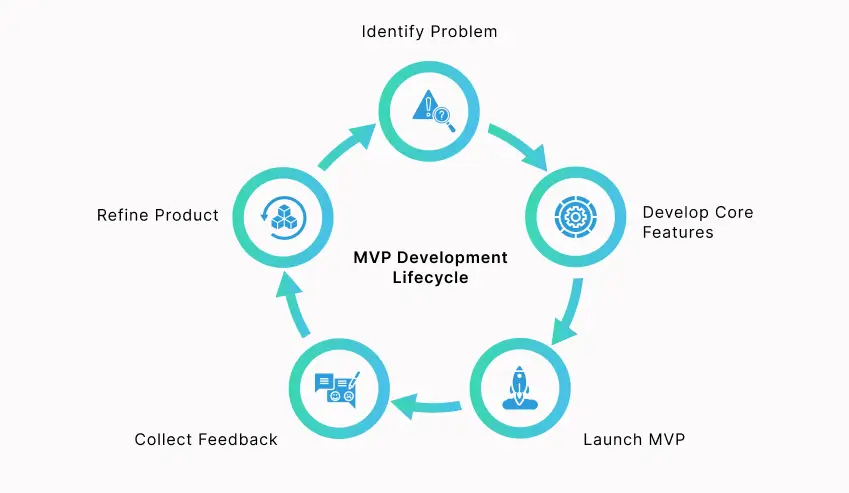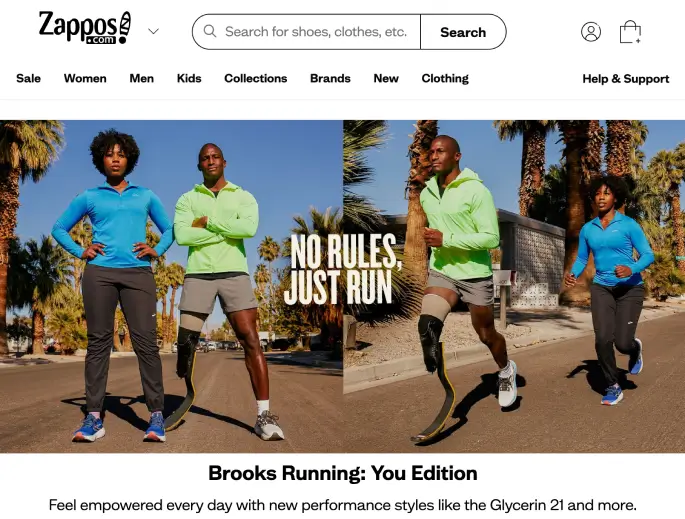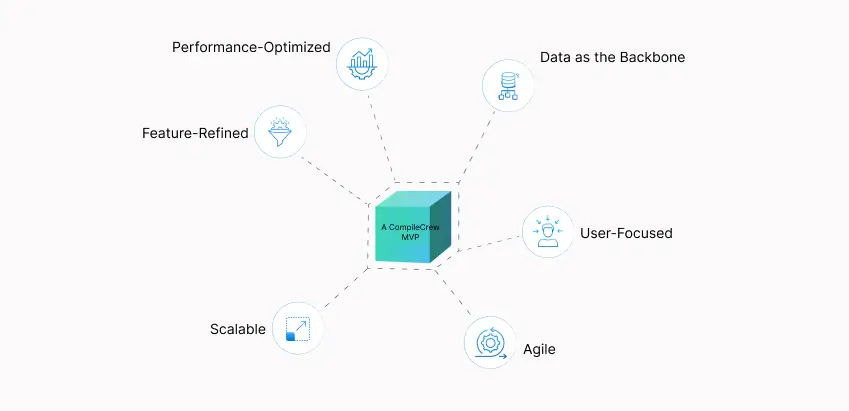In the realm of technology startups, swift and strategic action is key to achieving success.
A pivotal element in this journey is the adoption of the Minimum Viable Product (MVP) model.
This approach is not just a trend but a fundamental strategy that enables you to test, refine, and enhance your products efficiently.
MVP development is particularly crucial in the tech and SaaS industries, offering a realistic and effective pathway for product development and market entry.
Through this article, we aim to dissect the numerous advantages of MVP development, equipping you with the necessary insights to utilize this strategy to its full potential. Our focus is on demonstrating how MVPs can accelerate market entry and significantly contribute to a product’s success and scalability, especially within the fast-paced and competitive tech sector.
Understanding MVP Development
Minimum Viable Product (MVP) – this term, while common in the startup world, holds an indispensable significance.
At its essence, MVP development involves creating a product that possesses just the right amount of features to draw in early adopters and validate a product concept at an early stage. This approach is especially crucial in scenarios where resources are sparse and quick market feedback is essential.

MVPs are about embracing the ‘learn by doing’ philosophy.
Rather than dedicating resources to a fully-fledged product, startups are encouraged to focus on key functionalities that address their customer’s primary needs. This strategy is not only resource-efficient but also steers product development in the right direction from the beginning.
For tech companies, the MVP process starts with pinpointing the primary problem your product aims to solve.
Following this, it’s about identifying the most essential features needed to address this problem and creating the simplest version of the product to launch into the market. Despite its simplicity, this version should be substantial enough to provide valuable insights into market reactions and necessary enhancements.
The MVP development cycle is characterized by continual testing, feedback collection, and product refinement.
It’s a cycle of continuously learning, adapting, and evolving based on actual user data. This approach not only hastens the feedback loop but also aligns product development more closely with customer needs, diminishing the risk of market failure.
MVPs are now a vital tool for startups, especially in sectors like tech and SaaS where innovation is swift and consumer preferences change rapidly.
By adopting MVP development, startups can strategically position themselves in the market, adapt swiftly to market changes, and lay the foundation for future success.
Benefits of MVP Development for Startups
There are many benefits of MVP development for startups, including:
1. Rapid market entry: One of the primary benefits of MVP development is the speed at which startups can enter the market. This quick launch provides a significant advantage, allowing startups to establish themselves ahead of competitors and present their solutions to early adopters.
Fast market entry is crucial for gathering early user feedback, which is vital for informed decision-making about future product development and market positioning.
2. Cost efficiency: The MVP model is inherently cost-effective. It enables startups to allocate resources to developing only the essential features that meet the immediate needs of their target audience.
This lean approach not only reduces initial development costs but also optimizes fund allocation based on consumer feedback and market demands, enhancing the ROI and minimizing financial risks.
3. Focus on core features: MVP development requires startups to zero in on the most important features of their product. This concentrated effort ensures that each element of the MVP directly tackles the primary problem it is designed to solve, thus strengthening the product’s value proposition.
It also avoids the trap of over-engineering, where adding unnecessary features can complicate the product and weaken its effectiveness.
4. Attracting early adopters and investors: An MVP is a powerful tool for attracting both early adopters and potential investors. Early adopters are key for initial feedback and establishing a user base, while investors are drawn to startups with a proven concept and demonstrated market interest.
An MVP shows a startup’s commitment to fulfilling a real market need, making it more attractive to investors searching for promising opportunities.
5. Iterative development and learning: The MVP model is built on iterative development. Each iteration involves a cycle of building, measuring, and learning, enabling startups to refine their product continually based on real-world feedback.
This process promotes a deeper understanding of the market and user needs, allowing startups to evolve their product in a way that more effectively resonates with their audience.
6. Risk mitigation: Lastly, MVP development greatly lowers the risks associated with launching a new product. By validating market demand and product usability early in the process, startups can steer clear of the costly error of heavily investing in a product that doesn’t meet market needs. This method also enables gradual investment, scaling up as the product proves its market viability.
Examples of Successful MVPs
The MVP concept has demonstrated its effectiveness not only in theory but also through practical application, with numerous startups employing this strategy to reach significant milestones.
Let’s examine a few notable examples.

Spotify
Spotify’s ascension to the top of the music streaming industry began with a straightforward yet impactful MVP.
Launched in 2008, Spotify’s initial version offered a basic, user-friendly platform for music streaming, focusing on a key feature – a vast, legally streamable music library. This launch was crucial for assessing user interest and gathering feedback, which was instrumental in developing additional features like music discovery, playlist creation, and social sharing.
Spotify’s incremental approach to building their platform based on user data and preferences was a foundation of their success.

Zappos
Zappos, a leading name in online retail, started with a minimal MVP to test the viability of selling shoes online.
Founder Nick Swinmurn initially created a basic website showcasing shoes from local stores, without holding any inventory.
Orders were fulfilled by purchasing the shoes from these stores and then shipping them to customers. This low-risk MVP approach allowed Zappos to confirm the market’s readiness to purchase shoes online, eventually leading to the development of a comprehensive e-commerce platform. It was a strategy that provided invaluable insights into market behavior and user preferences, guiding the company’s future growth.
These examples highlight the transformative impact of MVPs in the startup ecosystem. Both Spotify and Zappos began with the essentials, focusing on primary functionalities that resonated with their audience.
The feedback and insights obtained from these initial versions were essential in shaping their evolutionary paths, ensuring that their development was aligned with market demands and user preferences.
How CompileCrew is Elevating MVP Development
In a competitive startup landscape teeming with companies vying for attention, CompileCrew sets itself apart by redefining the MVP development process. Our approach goes beyond conventional methodologies, infusing innovation and strategic insight at every stage.

Data-Driven Development
At CompileCrew, we emphasize a data-centric approach. Prior to commencing MVP development, we undertake comprehensive market analysis and user research.
This ensures that our MVPs not only meet immediate market needs but are also scalable and adaptable for future trends. From the beginning, we integrate analytics tools, enabling swift pivots based on
real-time feedback.
Emphasis on User Experience
User experience (UX) is super important in our MVP development strategy.
We believe an MVP should be more than functionally sound; it should offer an intuitive and engaging user experience. Our dedicated team of UX experts ensures that even the most basic version of the product feels complete and
user-centric.
Agile and Adaptive Approach
Our development process is inherently agile, allowing for quick adjustments and iterations.
CompileCrew facilitates flexible adaptation to user feedback and market changes, ensuring that the end product is precisely tailored to its target audience.
Strategic Feature Prioritization
We identify and prioritize the most impactful features for your MVP. By focusing on features that deliver the highest return on investment (ROI) and align with long-term product objectives, we ensure delivery of value.
Partnership Beyond Development
Our involvement doesn’t end with the MVP launch. CompileCrew serves as a strategic partner, advising on post-launch strategies such as user acquisition, scaling, and further product enhancements.
Conclusion

Sheena Ambarin
Sheena is a growth hacker at CompileCrew. She loves everything about technology and startups. When she’s not in strategy mode, you’ll find her recharging with some rock and metal music.


